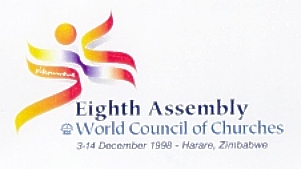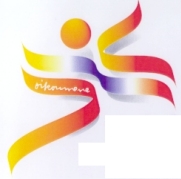
 |
Click to different
language versions of this text en franšais
en franšais auf Deutsch
auf Deutsch en espa˝ol
en espa˝ol |
A Jubilee Assembly | |
 Assembly theme Assembly theme The African context The African context Looking back, looking around Looking back, looking around Common Understanding and
Vision (CUV) Common Understanding and
Vision (CUV) The Decade - What next? The Decade - What next? Participants, visitors... Participants, visitors... To learn more... To learn more... |
A Jubilee Assembly
It was an historic moment in August 1948 when representatives from 147
churches around the world who had come together in Amsterdam declared
their commitment "to stay together" and to form the World Council of
Churches as an instrument to promote the unity of the Christian church.
The word "jubilee" is often used to speak of any 50th anniversary. But the
origins of this term go back to biblical times - to the provisions made
(Leviticus 25) for the people of Israel to hold a "jubilee" every 50 years.
Land would be restored to its original owners and slaves set free. Later,
the prophets of Israel took up these elements of liberation, reconciliation
and new beginnings into the promise of the "year of the Lord's favour" - a
promise whose fulfilment was announced by Jesus in his first sermon in
Nazareth, recorded in the gospel of Luke.
The African context
Nowhere in the world is the message of the gospel
spreading more quickly and striking deeper roots than in Africa. A crucible
of cultures and communities, a continent of vitality and joy, Africa also
reminds the world community of some of the critical issues that must be
faced together in the
Looking Back, Looking Around
How has the World Council of Churches fared over these
fifty years?
For the first time at a WCC Assembly, churches, partners in the ecumenical
movement and other groups and organizations which share common concerns
will have the opportunity to set up their own presentations, exhibitions
and opportunities for conversation in a Padare - the word for
"marketplace" in the local Shona language.
Looking Ahead
Common Understanding and Vision:
How can the WCC serve the churches in the most effective way as an
instrument of the worldwide ecumenical movement? As the Council looks
towards its next fifty years, in a world that is vastly different from that
of Amsterdam 1948, what shape and what directions should it take? Do we
also need a wider and more representative forum of the ecumenical movement,
which would involve many other streams of Christian life and expression
that have come into being over the past decades?
An intensive study process on
questions like these, undertaken over the past eight years, will be brought
to a conclusion at the Assembly, culminating in a service of thanksgiving,
celebration and recommitment.
Leaders of the WCC's more than 330 member churches are being invited to
Harare to make this recommitment publicly. Radio and television broadcasts
are being planned to enable the whole oikoumene to share in this solemn
and historic event. Congregations and parishes around the world are also
being encouraged to observe Sunday 13 December 1998 as a special day of
recommitment to the ecumenical movement.
The Decade - What Next?
The Eighth Assembly will mark the culminating point of
the Ecumenical Decade - Churches in Solidarity with Women, a ten-year
effort launched by churches around the world at Easter 1988. The end of
these ten years will be the occasion for a four-day
Decade Festival, to be held in
Harare just before the Assembly.
But what next? How will the findings of the Decade influence the life and
ministry of the churches in the years ahead? Special sessions, dialogues
and witnesses will present these concerns to the 4000 women and men who
are expected to attend the Assembly.
Aerial view of the University of Zimbabwe campus.
Experiences and insights will be shared, old friendships renewed and new
ones formed. The spiritual life of the participants will be enhanced by
daily ecumenical worship, always a central and unforgettable part of any
WCC Assembly.
To Learn More...
A resource volume has been published for groups and individuals interested
in further study of the Assembly theme: Turn to God - Rejoice in Hope (WCC
Publications, 1996, SFr.9.90, US$7.95, ú5.25). This includes seven Bible
studies, six meditations and five liturgical aids highlighting aspects of
the theme and drawing on insights from many countries and many Christian
traditions.
For information about ordering this book (including availability of other
language editions) and about other helpful materials for Assembly
preparation, the Assembly itself, the visitors programme or Recommitment
Sunday, please contact the WCC Eighth Assembly Office in Geneva or the USA
(see below).
If you want a colour slide, or colour or b/w photo by ordinary mail, send an E-mail inquiry to photo | |
|
World Council of Churches Eighth Assembly Office P.O. Box 2100 1211 Geneva 2, Switzerland
Fax: (+41 22) 791 0361 |
 |
For the USA: United States Conference World Council of Churches 475 Riverside Drive, Room 915 New York, NY 10115
Fax: (1 212) 870 2528 |
 Return to list of Assembly and Anniversary materials
Return to list of Assembly and Anniversary materials Back to WCC
homepage
Back to WCC
homepage